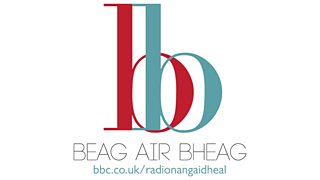Oisean a’ Ghrà mair Sreath 12: 2
CRIOMAG: Tony Kearney - Beagan Spìosraidh nam Beatha

1. BHA MI AIR MO ...+ verbal noun
AUDIOCLIP - Tony Kearney:
Bha e dìreach gu tur ùr agus a bhideo a bha a’ dol leis cuideachd. Bha mise dìreach air mo bheò-ghlacadh.
It was just completely new, and the video that went with it too. I was just transfixed.
Bha e air a bheò-ghlacadh, He was transfixed, entranced (‘caught live’).
(‘He was after his catching live.’)
Bha mi air mo ghlacadh. I was caught (‘after my catching’).
Bha thusa air do ghlacadh. You were caught (‘after your catching’).
Bha esan air a ghlacadh. He was caught. (‘after his catching’)
Bha ise air a glacadh. She was caught. (‘after her catching’, no lenition).
Bha sinn air ar glacadh. We were caught. (‘after our catching’)
Bha sibh air ur glacadh. You(s) were caught. (‘after your catching’)
Bha iad air an glachadh. They were caught. (‘after their catching’)
Bha ise air a beò-ghlacadh. She was entranced, transfixed.
Bha esan air a bheò-ghlacadh. He was entranced, transfixed.
Bha mi air mo thogail leis an naidheachd. I was cheered up, excited (lifted) by the news.
Nach robh thusa air do thogail? Weren’t you cheered up?
Tha e air a dhèanamh a-nise. It’s done now.
Tha i air a cumail air ais an-dràsta. She’s (been) held back just now.
Bidh sinn air ar toirt a-steach dhan talla mhòr. We’ll be taken in to the big hall.
An robh sibh air ur fiathachadh? Were you invited?
Bidh iad air am biathadh dà thuras san latha. They get fed twice a day.
2. —AS (gnìomhairean / verbs)
AUDIOCLIP: Tony Kearney:
“Spice Girls. Dà fhacal a tha dìreach dol còmhla cho math ’s a ghabhas.”
Spice Girls. Two words that just go together perfectly / as good as can be (‘as good as will take’).
“Nuair a chanas tu an dà fhacal a tha sin, tha dìreach na h-ìomhaighean bho na naoidheadan dìreach a’ brùchdadh air ais gu mo cheann.”
“When you say those two words, the images from the 90s just pour back into my mind.”
Mar a chanas iad fhèin, tha am package tha sin ag obair cho math, bidh iadsan a’ dol agus air àrd-ùrlar le na zimmerframes aca.
As they say themselves, that package works so well, they’ll still be going when they’re up on stage with their zimmerframes.
TRÀTH TEACHDAIL / LÀTHAIREACH (Future / Present Tense)
Gabhaidh mi an salad agus gloinne mòr fìon. I’ll have the salad and a large glass of wine.
Canaidh mi seo aon turas a-mhàin. I’ll say this once only.
Tillidh iad a dh’aithghearr. They’ll come back soon.
Bidh sinn air ais an-ath-bhliadhn’. We’ll be back next year.
Smaoinichidh mi mu dheidhinn. I’ll think about it.
Ach le A (nuair a - mar a - cuin a), MA, CÒ, DÈ
—idh → —as
gabhaidh → ghabhas
canaidh → chanas
tillidh → thilleas
bithidh (bidh) → bhitheas (bhios)
smaoinichidh → smaoinicheas
Dèan e cho luath ’s a ghabhas. Do it as quickly as possible, as soon as possible (‘as quick as will take’)
Tha an ceòl seo cho ùr ’s a ghabhas. This music is as new as can be, is totally new. (‘as new as will take’)
Tha an stoidhle aca cho eadar-dhealaichte ’s a ghabhas. Their style is as different as can be, is totally different.
Dè ghabhas tu? What will you have?
Ciamar a chanas mi seo? How do I say this?
Ma chanas tu sin riutha, tuigidh iad. If you say that to them, they’ll understand.
Bris cas, mar a chanas iad. Break a leg, as they say.
Cò bhitheas (bhios) ann? Who’ll be there?
Ciamar a sgrìobhas tu sin? How do you write that?
Nuair a smaoinicheas mi air bidh mi a’ fàs nearbhach. When I think about it, I get nervous.
Nuair a dh’fhalbhas an luchd-turais, falbhaidh sinne cuideachd. When the tourists go, we’ll leave as well.
Ma dh’fhalbhas tu tràth, chan fhaic iad thu. If you leave early, they won’t see you.
3. CHAN E ‘not’ (faic Oisean 1, CHAN ANN)
AUDIOCLIP 5 Tony Kearney:
“Dìreach na fhuair iad de mheas bho daoine, chan e a-mhàin clann òga agus nigheanan òga.”
“Just the amount of admiration they got from people, not just young children and young girls.”
Oisean 1: CHAN ANN not:
Chan ann sa bhad. Not immediately.
Chan ann airson sin. Not for that.
Chan ann a-mhàin san Eòrpa. Not just in Europe.
Ach: ‘not something / someone’: CHAN E
Chan e an taigh, ach an gàrradh. Not the house, but the garage.
Chan e a’ chiad fhear ach an dàrna. Not the first one, but the second.
Chan e a-mhàin clann òga. Not just young children.
Chan e a-mhàin na h-eisimpleirean a chuala sibh an-diugh. Not just the examples you heard today.
CHAN E, CHAN ANN – Dè an diofar?
Not the house. Chan e an taigh.
Not in the house. Chan ann anns an taigh.
Not just young children. Chan e a-mhàin clann òga.
Not just from young children. Chan ann a-mhàin bho chlann òga.
Not Tony. Chan e Tony.
Not because of Tony. Chan ann air sgàth Tony.
Not Europe. Chan e an Eòrpa.
Not from Europe. Chan ann às an Eòrpa.

